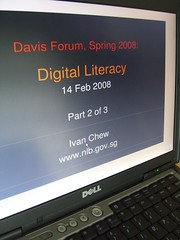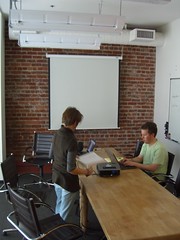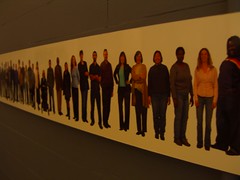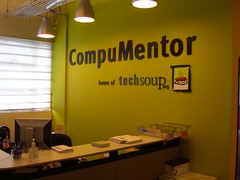Meaning, if you're a public library or non-profit organisation registered in the USA and/ or Canada, you can buy multiple accounts at a reduced price. More details at TechSoup's Flickr Donation Program page and the Maintain IT Project blog.
Which brings me to blog about TechSoup.




While I was in San Francisco, i.e. speaking stint at USF, Sarah arranged for me to visit her workplace at TechSoup (where I shared with her colleagues, Kami and Chris, on what Singapore's Public Libraries were doing with New Media).
From this page, it says TechSoup provides a range of technology services for nonprofits, including news and articles, discussion forums, and discounted and donated technology products.
They do much more.
Like NetSquared (www.netsquared.org), whose mission is to encourage non-profits and NGOs to understand and use social software and web tools.

There's also the MaintainIT Project (maintainitproject.org), a three-year project funded by the Bill & Melinda Gates Foundation. They work with public libraries to identify best practices of technical support for public computers.

Here's what I learned from Sarah via email (it's fascinating stuff to me, which I'll recount here):
CompuMentor
 Some 20 years ago, CompuMentor (the original, parent organization) was formed in an attempt to use The Well (an early message board) to connect techies with struggling non-profit organisations.
Some 20 years ago, CompuMentor (the original, parent organization) was formed in an attempt to use The Well (an early message board) to connect techies with struggling non-profit organisations.The idea was that techies with an interest in the social mission of an organization would "mentor" the non-profit organisation, and help them use technology to achieve their organisation's goals.
This continued for some time with various off-shoots.
TechSoup
About seven years ago, TechSoup.org started as an online community to help non-profit organisations use technology to meet their needs, with forums, articles, and trainings.
Soon TechSoup Stock started, for large companies to use TechSoup as a donation stream for their software products. Which was a win-win situation 'cos the donating organisation could obtain tax breaks and a non-profit organisation or a public library could buy, say, a donated Windows XP upgrade for USD$10 instead of the USD$280 original price.
Maintain IT project
The MaintainIT project is part of all of that -- an attempt to focus on American public libraries, gathering tips and techniques from the field on how to support public computers so that the librarians could learn from their peers.
[NOTE: At this point, Singapore librarians may wonder, as I did, why their public libraries didn't have their own technical support. Sarah explained that "many, many, many libraries don't have any tech support, and just rely on the kindness of friends and relatives and volunteers to help them out".
I realised that being such a large country, with different states and counties, cities and suburbs, and communities, the funding and priorities for public libraries in North America isn't homogeneous as I once thought it was].
What keeps TechSoup staff awake at night?
I asked Sarah this question. She replied that currently they're kept awake by trying to figure out how to sustain technical support models.
As I understand, money from the Gates Foundation isn't forever (it's a three-year grant). By the end of that time, the public libraries have to learn how to be on their feet without outside help from large foundations (read this related post by Jessamyn West, who sits in the MaintainIT project steering committee).
New Media
I asked Sarah how much of "New Media" is part of what TechSoup does.
She replied that they are starting to promote and increase awareness of Web 2.0 technologies (like through NetSquared). But it's just not something they are focusing on yet, although they recognise that many small libraries could benefit from Web 2.0.
Reflections
When I first learned of the MaintainIT project, I asked Sarah, "Why would librarians maintain your own computers? Don't you have tech support"?
Thinking back, it was a silly question. When I joined NLB in 1996, we didn't have tech-support either (more on this, in a future post).
On the part of Web 2.0, I'm not sure how it's perceived by librarians in the US. How much do they understand (or misunderstand)? I'd recommend this article by O'Reilly (the term came from them afterall) but then again, it may be better understood by those who are using Web 2.0
I think initiatives like NetSquared are in the right direction. It's important to create awareness about Web 2.0 technologies. But the site doesn't seem to be for Web 2.0 newbies.
For one, the site looks too "techie" at first glance. From the main page alone, I see terms like "Mashup Challenge", "Hackathon", "RSS". The listings of projects tend to make more sense to programmers and coders rather than end-users. A Web 2.0 newbie is unlikely to explore the site further.
I feel it's important to have a dedicated site for Web 2.0 newbies, along with initiatives like MaintainIT.
Maybe call it "MaintainSocialMedia", i.e. the New Media equivalent of MaintainIT.
Maybe it should be called "What Chicken Tastes Like". This is an inside joke of sorts, if you've been to my talks. As explained at this post, the point was that trying to understand new media without actually trying it out, was like trying to experience what Chicken tastes like without ever eating one.
To get someone to try out tools like blogs or to sign up for a Flickr account, I think it helps if you hear from what others have done, and more important, the success stories (big or small) they've achieved.
If MaintainIT is about sharing best practices in maintaining computers in public libraries, then the sister-site should be about other libraries sharing their practices in using social media. And sharing their observed or recorded outcomes.
I'd avoid terms like "Web 2.0" and "Library 2.0" which frankly, are just marketing-speak and does little to explain what its about.
As Sarah mentioned to me in passing, using those terms may even achieve the reverse of turning potential adopters off, since they don't see themselves identify with it.

nice post, ivan, and i wish i could have seen your talk at techsoup.
ReplyDelete"If MaintainIT is about sharing best practices in maintaining computers in public libraries, then the sister-site should be about other libraries sharing their practices in using social media."
ooh, that sounds interesting.